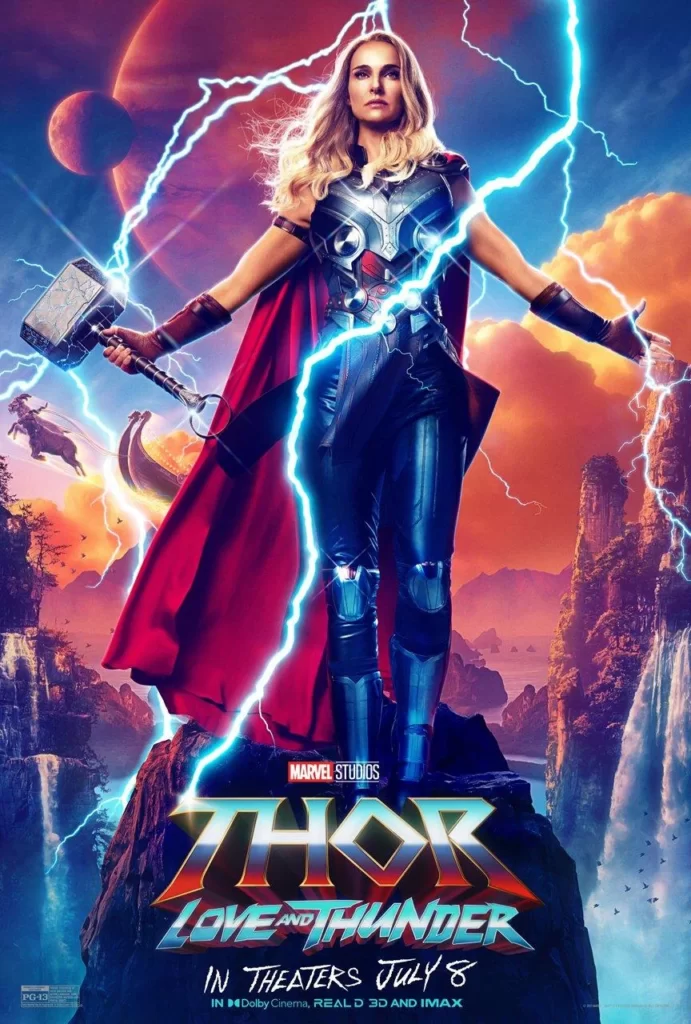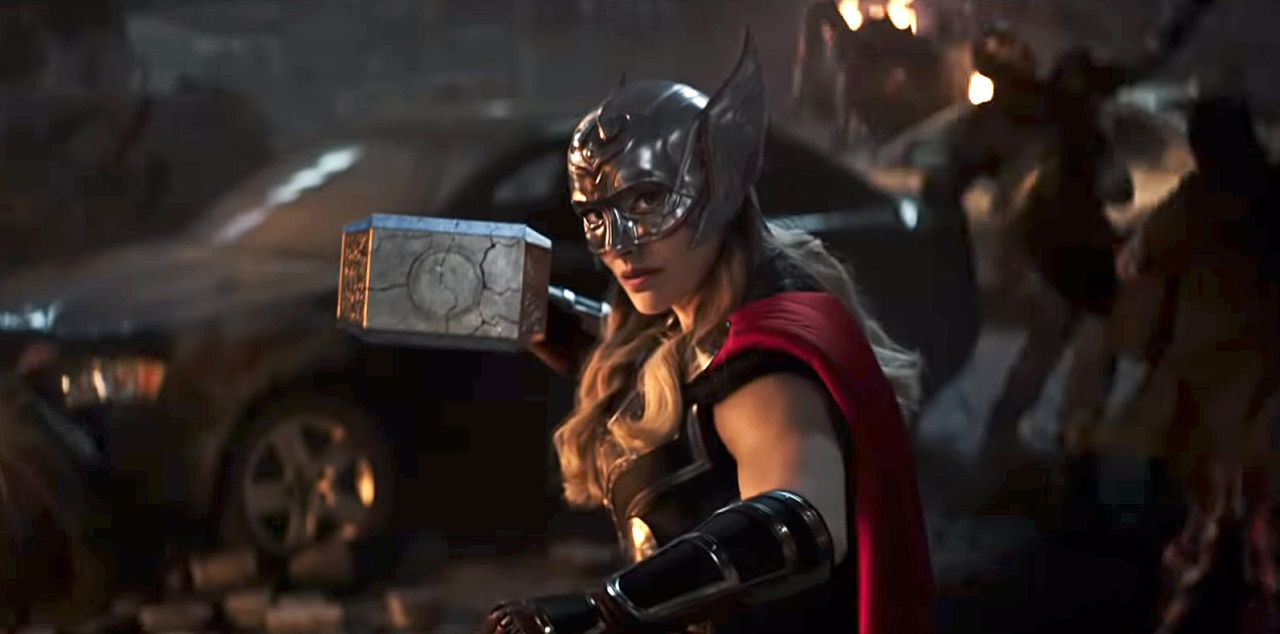An intergalactic actioner wrapped in a technicolour coating, Thor: Love and Thunder doubles down on the Waititi-ism’s to mixed effect.
Though not quite the battle-hungry warrior seen in previous instalments, L&T finds Thor (human statue Chris Hemsworth) somewhat of a man of zen. (All that time in Byron Bay revealing itself.) No longer driven to lead in crusades, applying his Asgardian godliness to assist those in need, the now free-range and scatterbrained Thor takes to meditation to keep his grief (and what immense grief he has) at bay.
He’ll take his coffee with oat milk, thanks.
In the wake of a new threat determined to kill all Gods, coming in the form of Gorr the God Butcher (Christian Bale sitting somewhere between Pennywise (It, 2017) and Nero (Star Trek, 2009)), Thor and the team (Tessa Thompson’s Valkyrie and Waititi’s rock warrior Korg) reunite, tackling shadow monsters and other mythological beings.

Returning director Taika Waititi, sharing scribe credits alongside Jennifer Kaytin Robinson (Unpregnant, 2020), imbues his trademark sense of quirk throughout the film’s two-hour runtime. This essentially becomes Thor’s persona, with Hemsworth doing a fine job relishing in the goofiness of it all. Pending your tolerance to his daggy sense of humour – the likes including awkward interruptions, bleating goats and other absurdities including Thor’s relationship with a jealous weapon – will inform how you take to L&T. For those unable to subscribe to Waititi’s wisecracks, there are silences to be felt, particularly given the film’s ten-joke per minute approach.
The film finds its footing when it operates as a break-up movie, with Thor reckoning over the fallout of his relationship with scientist – and newly crowned superior/wielder of the mighty Mjolnir hammer – Jane Foster (Natalie Portman). Flashbacks detailing their relationship, from the happy to the sad, offer many of the film’s most touching moments. It is in this twee where the Hunt for the Wilderpeople (2016) filmmaker shines. This said, the incongruous return of Foster, who was absent in Ragnarok (2017) and other Marvel collabs, feels driven by a desire to see her return than it does feel natural to the story. There is some struggle by Portman tuning into the zany Waititi frequency, with her effort to deliver the humour – coming through her attempts to nail the action one-liner – reading as strained.
Without spoiling, a frequent (and perhaps troubling) plot element of Waititi’s films further reduces Portman’s contribution to the film. Waititi is no stranger to balancing the dark and light, with films including Boy (2010) and the aforementioned Hunt for the Wilderpeople remaining buoyant crowd-pleasers despite their occasional bleakness. In L&T, this balance isn’t as elegantly handled. True to Marvel form, the film builds toward many ultimate scuffles – one of the final black-and-white brawls ought to make Ingmar Bergman smile – which ultimately forces the film away from nailing the emotional crescendo.
The inclusion of Gorr feels like a backstep for the series, with the shark-toothed villain having to follow the delicious grandeur of Cate Blanchett’s Hela (Ragnarok, 2017). Gorr’s motivations are a product of great tragedy. He, along with Thor, has experienced great loss at the hand of Gods, with the sparring warriors’ juxtaposition loudly announced by the film. It is however unfortunate that the screenplay denies Gorr a story defined in complexity and nuance, instead favouring Marvel’s familiar brand of instant menace to create a villain so thin in characterisation that it denies the actor – particularly one of Bale’s esteem – from making their own.
We must also speak about Russell Crowe’s hedonistic Zeus; a performance whereby Con the Fruiterer lives on in spirit. In a time when Tom Hanks’ performance as Elvis’ manager cops flack for being pantomime-like, Crowe takes the cake, delivering an extraordinarily OTT performance as a belligerent god who puts his priorities first. (And my-oh-my does he glide in Grecian garb.)
Action scenes follow the rigmarole of colourful army tussles. They are illuminated by a visual aesthetic that lands somewhere within Jim Henson and Terry Gilliam in ‘80s magnificence. A combination of soundtrack and score roars throughout the film, creating something of an arena spectacular. The effect of this rock opera aligns well with Thor’s overall character progression, avoiding the pitfalls of using music to rush building a personality a la Guardians of the Galaxy (2014) (they too briefly appear in what is predicted to set-up their own future film).
This reviewer feels continuously peeved at Disney’s attempt to establish queer characters in its universes. Gay people struggle to exist at the forefront, existing as throwaway lines that scurry away before offering anything meaningful in terms of exploration. It is the same in L&T, with one of the more flippant inclusions played for laughs. Perhaps expecting more from a series is perhaps the biggest fantasy of it all…
Regardless of its shortfalls, the aggressive enjoyability of the Marvel franchise rocks on in Thor: Love and Thunder.
Director: Taika Waititi
Cast: Chris Hemsworth, Natalie Portman, Christian Bale
Writer: Taika Waititi



